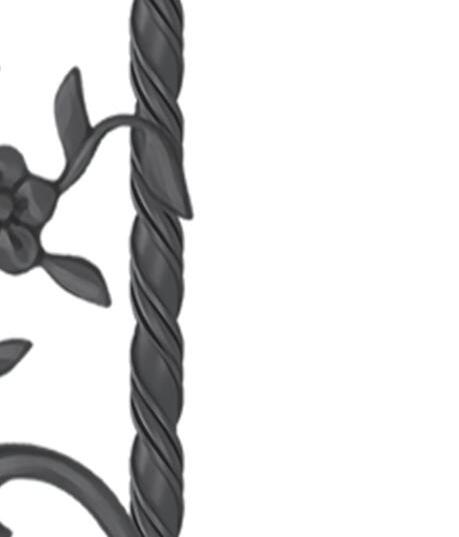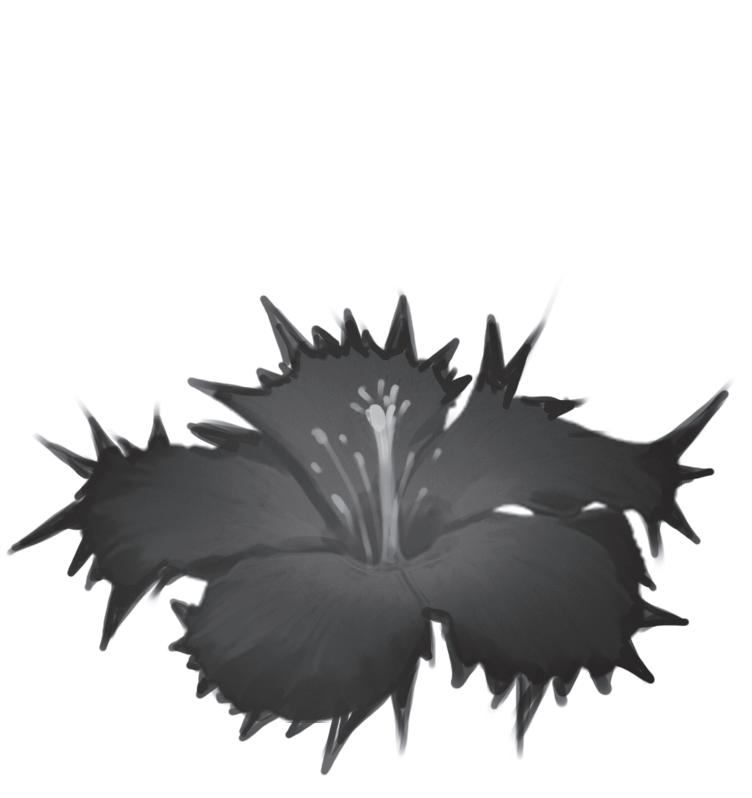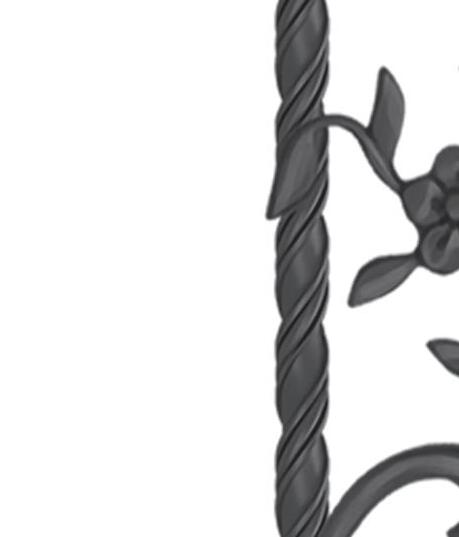g PArT I: THE INVITATION
Paris, France
September 1913, Cycle of Light
One petal for wisdom, Two for the muses
Three to affect the mind
And four to heal all bruises.
3
ONE
Every year on my birthday, my mother gifted me a riddle. It wasn’t my entire gift, but until I solved it, I wouldn’t receive my true birth day present: a bottle of her sweet, handcrafted lavender perfume; a bun‑ dle of freshly clipped wildflowers; or, on my eighth birthday, a swing set in the garden wrapped in long vines of wisteria.
I suppose she was preparing me, in a way, for the largest riddle of my life—why she disappeared without a trace seven years ago.
The horses jerked to a halt.
My coach driver poked a bald head through the curtain that sepa‑ rated us. “For gods’ sake, young lady, I can’t leave you here! Don’t you know Razorthorn Manor is haunted?”
As a matter of fact, I did know.
I peeled my gaze away from my gold pocket watch to look out the open window. Now a shade of its former self, Razorthorn Manor looked dull and overgrown, with vines smothering the cracked windows and empty sills. The knocker attached to the front door, shaped like the estate’s namesake plant, had rusted from copper to murky green. The bleached roof sloped elegantly on either side, held up by several col‑ umns, the ivory pillars engraved with Flora’s abundant garlands.
And there: the wrought‑iron gate to the garden stood ajar, exactly as I remembered it, its silver lock and chain puddled on the grass. I
didn’t need to look inside to know what was left behind— the garden where I played and laughed, cried and raged. Dead.
Autumn air blew through the coach’s window, soaked with a haunting chill. But it wasn’t the wind that made me shiver.
This was the last place I saw Maman.
I cleared the cobwebs from my memory and summoned the dregs of one recollection in particular: Maman and I standing in front of the garden gate, just two days before her disappearance.
“How about another round of Marbles and Riddles?” Maman asked. Despite the way the sun’s rays poured over her, she looked like a faded version of herself, as though I were watching her move from within a creased sepia photograph.
“Shh!” I chided. My hair was tied up in a bun in a failed attempt to emulate my mother. “Don’t let Marta hear us!”
Maman winked, her deep brown eyes alight with mischief. She pre‑ tended to lock her lips, then pressed a velvet pouch of marbles into my tiny palm like it was a secret she wanted me to protect. I dashed off, barely noticing the faint wrinkle of worry between her brows.
“You must have heard the rumors, I’m sure,” the driver remarked at my silence. “Ghosts, strange sounds in the garden, ever since that woman drowned in the Seine—”
“Her name was Tara Gupta,” I snapped, my voice as harsh as the tug of the reins that leashed the horses to the carriage. “And she’s no phantom.”
Not the physical sort, the kind that haunts a place past death. No, my mother was a ghost of a different kind; the kind that plagued my mind, my dreams, and my nightmares.
“Of course, mademoiselle,” the driver said, beads of sweat dotting his brow. “But don’t speak her name too loudly, lest Pluto hear us and think we wish for trouble.”
I smiled thinly. Clearly this man had no clue who I was— but then, I liked it that way. People who did know always compared me to my mother: how I looked, how I dressed, how I acted. Like I wasn’t a girl, a daughter, in my own right.
Worse yet, the ugliest, beastliest rumors about her also colored their views of me. One rumor implied my mother hadn’t drowned but dis‑ appeared for a bit of fame, planning to return within a month. Another said she was secretly bankrupt, owing money to the government and running from her home in shame. And most laughable of all: she’d joined the circus to become the Disappearing Woman, teleporting twenty meters in a matter of seconds.
Maybe not quite so laughable for the latter. Maman had been a famous aerial artist, performing at the most talked‑about theaters in Paris: the Cirque Molièr, the Cirque Fernando, the Nouveau Cirque. People would come from near and far to see her breathtaking act. After she became a household name, she would often put on her show right here at the gate to Razorthorn Manor. She was something of a scandal ous woman that way.
On instinct, my left hand rose to the necklace hidden under my dress collar, thumbing the key‑shaped pendant as if it might unlock the truth to Maman’s fate. She had left it to me, after all.
“Thank you for the ride.” I pressed a heavy coin into the driver’s upturned palm. On it, Janus’s two faces winked in the gray September light.
I exited the coach with my trunk. The horses trotted away, the driver shaking his head. I clutched my coat tight, turned to the house— and stopped cold.
A stranger was standing outside the door to the estate.
The boy looked my age. Where had he come from? When his eyes caught mine, he raised a bony hand in awkward greeting. I didn’t return it, preferring to study him from toe to collar. He wore a black trench coat that even a hard‑of‑seeing seamstress would know needed hemming, and he was nervously adjusting a bronze pipe between his fingers as if it were a prop and he was about to enter stage left. Altogether, he affected a caricature of an eminent but decidedly fictional detective.
I crossed the uneven cobblestone path toward him. His skin was flushed from the biting morning air, fading the freckles on his nose. Dastardly strands of reddish‑brown hair were covered by a burgundy cap, which he doffed in greeting.
“A Sherlock reader, monsieur?” My old nanny, Marta—who had raised me in this very manor— always told me it was important to start a conversation with a common interest.
“How could you tell?” the boy asked, his English accent thick. Like mine, his eyes were a deep, rich brown, and his skin held a tawny tint despite his pink ears and nose.
In answer, I pointed at the small book poking out of his right pocket: A Guide on Holmes.
“Ah, that,” the boy said, tucking it deeper as if it were a shameful report card. “I’m a fan of detective stories. But Father prefers I focus on poetry. So I’ve dedicated four days a week to reading Rimbaud. You’ve heard of him, I assume? Voyelles ?”
I narrowed my eyes. Certainly everyone in Paris knew Rimbaud.
“This is my family’s property,” I stated, painting on a cool smile that did little to hide the scowl underneath. “Are you here to deliver something? A parcel, perhaps?”
“Not a parcel, no.” The boy removed his cap and extracted a small piece of folded paper. He unfurled it, revealing the street name, rue du Renard. “There was more to the message, but I ripped this part off as instructed.”
“As instructed?” I echoed. What was going on?
“Richard Fox,” the boy announced, replacing his cap and sticking out a hand. I shook it weakly, still turning his words over. “Well, tech nically Richard Fox the Second. But just Fox will do.”
The boy did remind me of a fox, with those keen eyes, blushing cheeks, and fiery hair.
“Pleasure to meet you, Just Fox.” I hadn’t meant to make him laugh, but he snorted anyway. Odd, this Richard Fox.
He pinched his features back to neutrality. “So, your family owns the manor?”
“They do,” I explained, “though it’s been empty for ages. Well, seven years to be exact.” I shook my head. “Where are my manners? I’m Sana Gupta.”
At that name, the boy frowned slightly.
He must have caught a whiff of my reputation, then. The famous Tara Gupta’s only child, a child whose displays of temper and lack of decorum— something I considered highly overrated—were whispered of even when I was very young. And since then? An absent heiress. My new guardians in Canada, whom I’d been staying with since my
mother’s death, had received word from my estranged aunt Neena to meet me for my homecoming.
Now that I was here, I could fulfill my dream: to claim my inher‑ itance and restore the house to its original grandeur. It would awaken to its former glory, the way a perennial withers before returning to full bloom. And then I would sell it and make a life all my own.
This was my chance to say goodbye to the estate where I had crawled, walked, and eventually raced among poisonous thorns.
A chance to say goodbye to Maman. To the woman who had never said goodbye to me.
“Enchanté, Sana.” The boy’s frown had morphed into a look of curiosity. “Shall we explore the moor? This place must be crawling with ghosts. Even a spirit hound or two.” He leaned in conspiratorially. “Even all the way out here in the twenty‑first arrondissement, I am cer tain we’d be able to find something . . . otherworldly.”
He was referring, obviously, to the inexplicable string of strange happenings that had plagued Paris: the Great Flood of 1910, the light ning storms of 1911, and so on. They were splashed all over the morning papers, even an ocean away. Signs of the gods and their displeasure. Some went so far as to say that Paris was cursed— by Neptune, most thought, given the tempests. Many prayed to him, to placate him, though they didn’t understand what offense humanity had committed in the first place.
“This estate is quite safe, I assure you,” I sniffed.
“Not even any ghosts on the property?”
“I think the real question you should be asking is if there are any bodies,” I offered dispassionately. I couldn’t help myself.
Fox paled; I grinned.
“Come now, Sherlock,” I said. “Holmes never believed in ghosts.”
At that, the door handle began to rattle as if possessed. Startled, Fox dropped his pipe, and I jerked back. The door swung open to reveal a woman with a shock of corn‑silk hair streaked with silver, wearing a smock and carrying a tray of freshly filled lemon macarons.
“Marta?” I managed after a moment.
“Mademoiselle Gupta!” My old nanny twisted her lips into a grin. “If it isn’t the girl with the rosy cheeks and sour smile. Some things never change.”
My face burned. I glanced at the garden, memories stirring inside of me. My childhood was full of days spent memorizing the shapes of the clouds, of grazing waxy orchid petals that stained my fingertips vio let. But Marta was right—not a day went by without a tantrum of some kind. And when I’d roared with anger, it was Marta who had rushed to soothe me, not Maman.
Long‑buried feelings resurfaced. When my mother left to perform her act overseas, it was considered normal. I pretended I was fine while Marta kept the household together. And when my mother came back, as she always did except the last time, she slipped in like she’d gone for a mere walk about the gardens, regaling no tales of her performances or discoveries. Sometimes I wondered if she’d kept secret a whole life outside of the manor. In the time she did spend with me, playing games and riddles was all that mattered—not slipping my baby‑blue Mary Janes onto my feet, nor twisting a velvet ribbon into my braided hair.
Speaking of.
“Your hair . . .”
Marta ran a hand over her graying locks. “Yes, raising children will do that to you.” Her fair skin looked like it hadn’t seen sunlight in weeks. “But I see I am not the only one ill‑affected by time. Only seven years, yet you’ve already begun to sprout premature wrinkles.” She tut ted. “I thought you were past temper tantrums?”
I pressed a hand to my forehead, which I prayed was smooth enough. “I’m not as stubborn as I used to be.”
“I would hope not.”
I still couldn’t quite fathom that she was here, or how much time had passed— time that had brought us to the same height.
“You made macarons?” My mouth salivated at the sight of my child hood favorite, one she reserved for special occasions. Had she remem‑ bered it was my birthday? And if so, why were we dancing around the subject with trivialities like wrinkles?
“Yes, I knew you would be arriving soon,” she said. “Come in. And welcome, dear boy. You must be Monsieur Richard Fox.”
“I simply go by Fox, madame. Are you the one who invited me here?”
“And where is Neena Massi?” I wondered aloud. “My aunt should be here. She’s supposed to help me with the house.” I had met my moth er’s sister at least once as a child but could barely remember her.
Marta’s gaze skittered away from mine.
“Come inside, children,” she said, evasive as ever. “We have a lot to discuss.”
TWO
“How long does a flower have to live?” Maman asked me once, tapping the dimple at my chin.
“As long as the love of its owner,” I replied.
She had grabbed my nose playfully, excited that I was a professional riddle solver. That one wasn’t a riddle so much as a lesson. Care for what is yours. Love thy garden, love thyself.
The words hummed like honeybees in the back of my mind as I entered the house. Each time I had imagined stepping back into Razor thorn Manor, I had seen myself weeping. I never would have guessed no tears would arise. I must have shed them all when Maman disappeared without leaving a note behind.
Instead of feeling a swell of pleasure at seeing my old home, my heart fell like a heavy coin into the Seine. Even my memory couldn’t paper over what I now witnessed. The floral wallpaper had begun to peel and fade. Some of the walls sagged inward, like a child clutching their knees. Dust motes circled through the air. The only light came from the old chandelier, which bathed the entrance chamber in a deep orange glow. I had suspected disrepair—it was what I hoped to reverse— but what I didn’t expect was the frigidity of the house’s embrace.
The cold, unfeeling emptiness.
The scent of lemon zest whisked through the air. Memory led my
feet, carrying me all the way to the kitchens. How strange it was to walk the halls of my childhood, so similar and yet so . . . empty. So much taller was I now that the corridors seemed too narrow. As if I had out‑ grown the home before it outgrew me.
“Incredible,” Fox said, following behind me. He gestured at the four additional trays of macarons on the kitchen’s central wooden table. “Mother never bakes for me. She resents it just as much as the illness that’s eating her away.”
“I’m sorry,” I said, startled, but Fox simply shrugged, like he’d heard the stiff apology too many times before. I knew the feeling; apol ogies didn’t fill Maman’s absence, or the emotions that came with it.
“On the other hand,” Fox continued, “Father says baking is a sci‑ ence, so I should study genetics before I even attempt a sponge cake.”
“Biology before baklava?” I suggested, trying to lighten the mood. He must not have thought it was clever, because he simply examined the macarons at eye level.
Marta’s voice was oddly warm behind us. “I’ve made raspberry macarons as well. Go on. Try them.”
If this were a talking picture, we’d reached the part where the boy tried the sweet old grandma’s cake, smiled dumbfoundedly, and pro ceeded to drop to the floor, poisoned.
But this script went askew. Famished from the trip, I gave in and tried a lemon macaron, taking a careful bite before stuffing the rest into my mouth with sudden appetite.
Each mouthful of the slightly crunchy exterior and the soft middle was like a summer day in the garden, when Maman brought lemonade to my wicker swing set deep in the undergrowth. She had always told
me that the garden was gargantuan, filled to the brim with plants: pro fusions of roses and privets; riots of foxglove, lupine, and hollyhock; pergolas overgrown with clematis and jasmine. I never knew my father, but it was certain from the love in Maman’s eyes that she and the gar den were the truest soulmates to ever have existed.
Envy gripped me at the thought of those same flowers. Maman cared for them so much—it was only natural that they died after she left. Sometimes I wondered if she would have paid me more mind if I were part flower, part girl.
Marta cleared her throat sharply.
“Now, Richard Fox,” she said, “I am Marta LeBlanc, keeper of the estate and former nanny to Mademoiselle Sana Gupta. To answer your earlier question, I did invite you here by post, and you arrived quite promptly. Thank you for coming all this way.”
Promptly? What was this boy invited for? And how far had he trav‑ eled? If his English accent was any indication, his trip had taken only a few hours. Meanwhile, my transatlantic flight was noisy and not at all smooth, but at least I had my cross‑stitch to accompany me. (One might consider that a dangerous sport on a small, bumpy airplane.)
“I should call upon the others from the sitting room. Mademoiselle Flores—”
A girl appeared in the kitchen in a flash. “Isabelle, please. Those macarons were delicious, madame. You got the feet just right— a feat in itself.”
My nanny brightened as she flapped a hand. “It’s an old family recipe.”
This girl had drawn a smile out of Marta quicker than I ever could.
Warily, I studied her from the bottom up. She wore black boots and an ivory‑white day dress with stylish Italian sleeves. Her dark curls fell in long waves, her tan skin washed with a dewy glow. On her nose sat a wiry pair of glasses, which framed her midnight eyes. But I swore when those eyes met mine, her lips pursed as if to resist a frown, and she offered me an icy gaze.
Marta glanced behind me. “Ah, there he is. Our final guest . . .”
“Not a moment too late, I hope,” a deep voice cut in.
I whirled toward— and nearly growled at—yet another stranger who had appeared in my home, this one a boy who had snuck up behind us. The suit he wore, unlike Fox’s trench coat, fit his every edge perfectly, tailored precisely to his tall body. He looked a bit like a gen‑ tleman plucked straight from the pages of an Austen tome, and he appeared to know it: handsome, poised, and wearing a half smirk, he exuded an air of haughtiness, not unlike the rakish George Wickham.
It was a good thing I preferred stories with rogues.
“Let me guess,” I began. “You aren’t here to deliver a parcel, either.”
The boy’s thick black eyebrows knit. “And how would you know what it is that I have to offer?”
I wasn’t used to someone being so level with me. I equipped myself with my sharpest retort. “I’m a good judge of character. Believe me, there’s nothing you have that I need.”
“Now, now, Sana,” Marta clucked, “where is your courtesy? These are our honored guests, and our hallowed halls are more than happy to accommodate them.”
Hallowed. I nearly snorted.
The estate’s grounds were ancient, rumored for generations to be a sacred precinct of the goddess Flora. Once, people had flocked here from far and wide, believing her grandiose magic was imbued into the ground, and that these very gardens sprang forth of her benefi cence. When I was a child, I foolishly thought that the garden’s flowers were tethered to my mother instead of Flora, as though she was their lifeline, their sun, their water, their soil. And when she was gone, there was no more point in living.
Now I knew better than to believe in puerile fantasies. This half‑forgotten history, likely imagined, was secondhand to gossip, and I didn’t have the mind to pay much attention to either.
I was too busy studying the three strangers in the room. The Sher‑ lockian boy; the well‑dressed but standoffish girl; and the boy who’d yet to introduce himself. Who were they? And why was Marta dodging my questions, her gaze restive, an excess of macarons on the table . . .
Oh.
There was only one plausible explanation. A birthday party. Of course.
I was here to collect my inheritance, my property— but it was also my eighteenth birthday. Were there going to be gifts, or performers, or more lemony confections? Perhaps a charlotte russe, as was tradition for my special day? Was Marta going to announce my majority before a crowd of well‑to‑do Parisians invited to the manor to witness the festivi ties? It was no wonder my old nanny hadn’t uttered any birthday wishes or that my aunt hadn’t shown herself. It was to be a surprise!
I could play along, for Marta’s benefit at the very least.
“Indeed,” Fox asked me, grinning, “where are those precious man ners you offered to me earlier?”
Two could play at that game. I bowed stiffly at the boy who’d entered the kitchen behind me. “My sincerest apologies, Monsieur . . .”
“Kim Minho,” he filled in. I recognized the naming system from my time practicing Korean with my governess overseas, who taught me that language was a key to locks often overlooked.
This boy, however, didn’t seem very unlockable.
“I assume this is the correct residence?” He held up a slip of paper identical to Fox’s. “I wasn’t aware there would be . . . others.”
“Oui, oui. Explanations will come soon,” Marta said, her French accent coming out in thick waves. From my time spent in India, Can‑ ada, and France, I only shared a fraction of my nanny’s accent, as if my tongue couldn’t quite decide where I belonged. “Now that you’re all here, we can begin.”
gThe study was a miniature library, with books in all kinds of languages and subjects surrounding a stately desk that faced a half‑moon window. Maman had spent much time here, affectionately naming it her “puz zle room.” Not for playing games, but quite literally puzzling. She had taken her coffee black and marched here right at dawn, like clockwork, for two months straight before her disappearance. Sometimes she’d passed entire days here, thinking to herself and not speaking a word, so that when dinner came around, her voice was dry from disuse.
The room was entirely how I remembered it. My mother’s chair even sat in the same spot, slouching with tired, aching legs. Instead of wide‑plank flooring, the study was covered wall‑to‑wall with a
carnation‑patterned carpet imported from India. The warm oak desk, made from a tree that had fallen in the garden, held several knots I’d traced over and over as a child.
Instinctively, I approached it, feeling the years between eleven and eighteen melt away. I was a child again, watching Maman fiddle with her papers, sunlight streaming through the curtains and kissing her warm brown skin. Maman lowered her glasses and let them hang from a beaded chain around her neck, pressing her fingers against the sides of her nose in exhaustion. But when she turned to me, the corners of her lips tilted up in a knowing smile. That smile . . . It flickered like autumn weather: some days dampened with rain, some days bright with sun shine. But it was a smile no less.
I wondered, occasionally, if she was just a vision made up in my mind, a woman I’d designed from scraps of paper and glue to patch the holes in my memory.
“Thank you all for arriving on time. I worried myself, wondering whether you would all make it,” Marta said with a weak laugh. She placed herself before the door, as if blocking the four of us from leav‑ ing. “Now, where were we . . . Ah, yes.” Marta unfolded and read from a paper in her hands. “ ‘The four of you children will have twenty minutes to complete this game—’ ”
“A game, you say?” Fox repeated quizzically. “I’m not sure I follow.”
“Apologies for my vagueness. I wish I could tell you more, but . . .” Marta glanced behind her, as if there could be someone listening. “ ‘You have twenty minutes exactly from the moment the door is closed to find the means to exit this room. If you fail, you will have no further need to stay on the premises. I hope none of you will come up against any . . . issues.’ ”
Marta focused her eyes on mine. She knew I didn’t play well with others.
Minho started, “But what about the—”
“Twenty minutes,” my nanny repeated, as if she were simply telling us the time until the next train left Paris. “Bonne chance.”
With that, Marta slipped out of the room, shut the door, and, turn‑ ing the outside lock, trapped us inside.
THREE
Minho tried to rattle the knob, but it wouldn’t budge. “I suppose this is one way to entertain visitors.”
My first thought wasn’t the peculiarity of Marta’s dramatic exit; it was the fact that I didn’t recall the study having had a lock before. Ever. Silence hung thick in the air.
The guests scrunched their brows in puzzlement, but I had an inkling of what was going on. Maman always gave me a riddle to solve the morning of my birthday; surely Marta was merely honoring that tradition with this little game, and inviting the party guests to play as well.
That was Maman: a woman who loved riddles so much, she made her life into one.
Maybe Marta was still preparing for the party and needed us out of the way. Once I escaped this study, she would have a table laden with sweets and cakes to eat, and the finest of Maman’s jewels for me to wear. Now that I was officially to inherit her things, it was imperative I did so properly. Maman had always wanted me to be her puzzle protégée.
A stab of longing pierced my stomach at the thought of my mother. No today was my birthday, and I wouldn’t let anything sour the mood.
“Hurry,” I said, “time is wasting.”
Fox checked his pocket watch. “Thirty seconds elapsed.” He
snapped the watch face shut. “I’ve always wanted to be in a locked‑room mystery, but I have to admit, I’m a bit stumped!”
The three strangers gazed at me expectantly.
Maman always told me that people were like flowers. If you were a flower, you would be a razorthorn. A girl with wits as sharp as a barb.
Meanwhile, Fox was a playful, if a bit aloof, hyacinth. Isabelle seemed to be a white carnation, innocent and pure. And Minho’s prickly demeanor reminded me of a lily of the valley— a beautiful flower that was toxic in every part of its anatomy.
The group was still looking at me as if I had an answer, so I gave them one. “If we divide ourselves, we will find an exit faster. Isabelle and Fox, you look at the desk. Minho and I will examine the room itself.”
Isabelle nodded. To my right, Fox slipped something out of his inner breast pocket— a magnifying glass, how Sherlockian—with which he began inspecting every inch of Maman’s desk. I would have taken offense to his snooping if it weren’t for the game.
I started by looking at the books covering the shelves from wall to wall. A collection of poems by Dickinson, Stoker’s Dracula for a rainy day, ten dense encyclopedias on the matter of the solar system . . . My fingers trailed over the spines, each covered in the finest layer of dust.
“Interesting door.” Minho rapped on the wood twice. “Walnut is heavy and durable. There’s no pattern, though—no sign of craftsman ship at all.”
I spun around, amused. “Are you a craftsman?”
“No.”
I observed his polished cuff links. “A man of enterprise? A young businessman?”
His jaw clenched. “Not exactly,” he said, almost offended, but then his tone lightened. “See the crown molding? It’s a specific design— a series of Roman numerals. Perhaps custom‑made for this very room.”
“And?” I asked, approaching him. He certainly had an eye for architectural detail.
“The rest of the manor doesn’t appear to have the same molding, which indicates—”
“This might be a clue,” I finished, breathless. Although I hardly knew the stranger before me, he tilted his lips into a small, satisfied smile— one that took me a long second to draw my eyes away from.
“Over here! ”
Whatever bubble Minho and I were in popped. We moved swiftly to join Isabelle and Fox.
“I think we found something: a series of newspapers hidden in the drawers. They were behind a false panel. I felt the seam with my hand and pushed.” Isabelle turned to me. “Any idea what these might mean?”
I glanced at the yellowed papers on my mother’s desk. Maman had loved to pore over the morning edition of The Paris Gazette, the rings from her coffee cup staining the pages like a signature. I circled a finger over one of those rings, at a loss.
“I— I’m not sure.” I looked up at the group, almost ashamed to let them down— but more terrified to let down Maman.
Look around you. Her voice was as clear as a crystal vase. What do you see, ma petite papillon?
Her nickname for me warmed my skin like candlelight on a long winter’s evening. Although Maman rarely called me her little butterfly, and oftentimes left me for days or even weeks, I remembered our time
together fondly. Beneath the shade of a vibrant magnolia tree, she told me stories of our ancestral home in Punjab, India.
“Over a century ago, our ancestors were farmers whose land grew arid and barren in the sudden heat of spring. No rain fell for weeks. They prayed and prayed, until a single seed fell from the sky. This they planted. And a spellbinding flower grew from the soil— the razorthorn.”
Maman was fascinated by the legendary flower, by its very idea of its existence. She always spoke of it with a mixture of pride and terror. Like it was something too great, and too powerful, to have ever come into this world.
I thought of the razorthorn proverb my mother once recited to me like a lullaby; it explained how the flower’s petals could be used, either alone or in combination, for four unique applications:
One petal for wisdom, Two for the muses
Three to affect the mind
And four to heal all bruises.
“Soon, my ancestors were no longer plowing the land under the sun’s punishing rays, but cultivating the flower’s power, and their fortune with it. They said the goddess of flowers, Flora, offered the razorthorn as a gift to the Guptas, a gift with godly abilities. Many of the Gupta women took to healing after discovering that brewing four razorthorn petals into a tincture could heal a bruise or reverse disease. My ancestors’ fame grew, and anyone who married into the family took the Gupta name with pride.”
“What if you combined all five petals? What power did that have? ” I’d asked her.
“Unfortunately, it remains a mystery. Our ancestors felt such a combination might be too powerful, and they never attempted it. But I believe one day this power will be discovered, and it will be the key to unlocking the world of the gods.”
She meant it metaphorically, of course. One could not enter Olympus.
But then I thought of the way Maman spoke of the flower— as if it were a deity. As powerful as Jupiter’s thunderbolt, or Neptune’s trident.
Jupiter and Neptune . . . I looked up at the Roman numerals on the ceiling, then back down at the newspapers. The pages had Roman numerals instead of Arabic numbers.
An idea sprang to mind. “Remember what Marta said? She hoped we wouldn’t have any issues. She must have been talking about the issues of the paper!”
“Aha! ” Fox cheered. He tilted the magnifying glass over his eye, enlarging it. “Which means . . . well, what does it mean?”
“It means,” Isabelle huffed, “that we’re finally getting somewhere. If we can figure out what’s next.”
“Deductive reasoning?” Fox tugged on his cap. “That I can do.”
“There are too many issues here to sort through.” Minho tapped the papers. “How do we know which one will give us a clue?”
“I’m guessing the Roman numerals might give us a start.” I pointed at the crown molding. “They go around the room in a pattern: one to five, five to one. Let’s look at those pages first.”
I handed out issues to each of them, glad they all agreed with my
reasoning. Precious minutes passed as we examined the papers, looking for anything relevant, but all I could spot were Maman’s coffee stains.
“Is anyone missing a page?” Minho asked. “Page five is missing in this collection.”
I double‑checked my sheaf. “That’s odd. I’m missing the fifth page in all of my issues, too.”
The Roman numeral V was missing in Isabelle’s and Fox’s collec tions as well. But what could the number be pointing us toward?
“Five is a prime number,” Minho supplied.
“We have five senses,” Isabelle offered, “and there are five basic tastes to the culinary palette, including sweet, salty, bitter, sour, and—”
“Jupiter!”
Everyone faced me like I’d grown a third eye.
“Jupiter is the fifth planet in the solar system from the sun!”
“And one of the gods,” Minho realized. My coach driver’s words echoed in my eardrums. Don’t speak her name too loudly, lest Pluto hear us.
The puzzle pieces snapped together in my mind. I scanned the shelves until I found the encyclopedias I’d spotted earlier and pulled each of them out. One in particular was stuck in place— the volume on Jupiter. I tried to pry it out. Even Minho tried, but it was no use.
Seconds slipped by like sand between my fingers. I needed to think the way Maman would. Every puzzle had a solution.
If the book wouldn’t come out . . . it would have to go in.
I pushed the book back, relieved when a click emanated from the shelf. The bookcase swung open to reveal a small, bricked cavity— a hidden passageway, low enough that we would have to proceed on hands and knees. While the others gaped, I wore a proud grin as I
dipped down and crawled. My mother had often hidden things around the house in little nooks and crannies for me to find, but this was some thing new. Were there more secrets like this waiting for me?
“Well?” I called back, already partway down the passage. The oth ers stared after me in fascination. “Are you going to look at it, or are you going to come?”
To my surprise, Isabelle entered first, followed by Fox, then Minho. Once we made it about ten paces, we arrived at a blocked end. I noticed a small pinpoint of light in the wall, reached forward, and felt a latch. A small door opened into the parlor, and I stood up and dusted myself off.
Nothing Sana Gupta couldn’t handle.
Minho, out last, slipped the door shut. It blended in perfectly with the wallpaper.
The parlor had several chaises, a piano, and a long, ornate table for tea and cakes. Portraits of philosophers hung on the wall (likely to incite stimulating conversation), but in practice, this had been more my play room and less a salon. To my left, the lilting tune of Berlioz’s Symphonie fantastique played from a phonograph. I recognized it as one I’d scuffed once when dodging Marta’s scolds, which had earned me a harsh chid ing and a spank on the legs.
“So? How much time do we have left?” I asked Marta, who stood by the door as she inspected the grandfather clock. Beside her, a butler I did not recognize waited with a tray of teacups and an ornate teapot.
No cakes or treats or birthday celebrations to be seen.
“Two minutes to spare. You children gave me a fright!”
“You really should have more faith in me,” I said in jest, but some thing was off. Where is my party? And my aunt?
Marta paused the phonograph. “Looks like everyone is accounted for. Please, have a seat. I’m sorry for all the fuss, but I was following direct orders. Thankfully, you all passed the test. Monsieur Champlain, the refreshments, if you please?”
The butler immediately laid the teacups on the low cherrywood table and poured the floral jasmine concoction to the brim.
“Marta,” I said, not even trying to hide the shade of bewilderment in my voice, “what is going on? I thought you were organizing some sort of surprise for me. For my birthday.” I tried to wear something remotely close to a smile but failed. I never did learn how to smile like Maman. The old butler, Monsieur Boucher, thought I ate lemons for breakfast.
“Ah.” Marta sat. “I’m sorry this isn’t what you hoped for, Sana, and I do wish you well on your eighteenth birthday . . . but I’m afraid we’re here for a much different reason. Now, I assume you all brought your slips?”
Each stranger obediently held out small, ripped papers, which the butler retrieved with pristine white gloves.
“One can never be too cleanly,” he said to me at my look of curiosity.
As Monsieur Champlain left to dispose of the papers, tailcoats dragging behind him, Marta continued. “I asked all of you to burn your invitations except for the address in hopes that no one else would be informed of today’s meeting.”
“Meeting?” I echoed, my voice razorthorn‑sharp. The only person I was meant to meet was my aunt—who clearly hadn’t bothered to show up.
“I still don’t understand, Marta. Why would you invite them to this estate?”
Marta chuckled grimly. “Why, Sana, that’s where you’re wrong. I didn’t choose to invite anyone. Your mother did.”
TARA’S ANAGRAM “My last words to Sana” u
PEEK UORY IMND PONE NDA OURY ERHAT COESLD.
[Solution: Keep your mind open and your heart closed.]
















